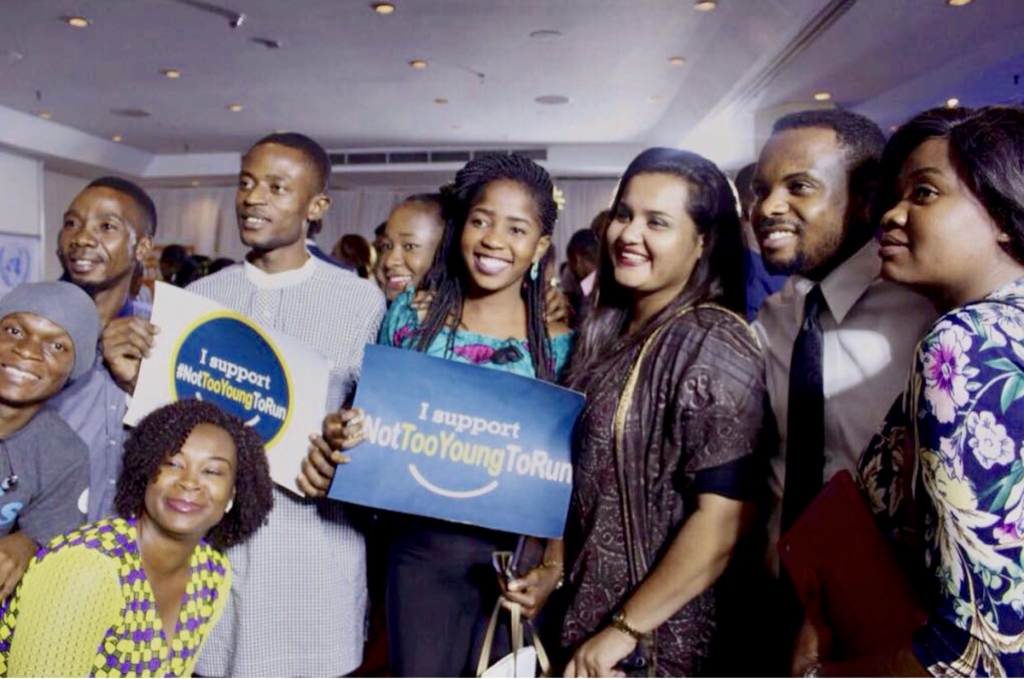Nigeria
During the visit to Nigeria, the Youth Envoy had the honor to meet the government representatives, including the Minister of Foreign Affairs, H. E. Geoffrey Onyeama, the Minister of Health, H. E. Isaac Adewole, the Minister for Youth & Sports, H. E. Solomon Dalun, and the Permanent Secretary Ministry of Women Affairs and Social Development, H. E. Ifeoma Anagbogu. The Envoy was accompanied by members of her team and the UNFPA delegation, which included UNFPA Nigerian Country Representative, Ms. Diene Keita and UNFPA Ghana Country Representative, Mr. Niyi Ojuolape. Also in attendance was the Nigerian President’s Special Adviser on Youth and Student Affairs, Mr. Nasir Adhama.
During the meetings, the Nigerian government noted the most prominent challenges young people are facing in the country, including limited opportunities for youth empowerment, lack of access to education for girls, lack of skills and jobs for youth, and irregular migration. Aware of the urgency of resolving these issues, the government, together with partnering organizations like UNFPA, has launched a number of programs and initiatives to tackle them.
One of them is the Civic Innovation Lab in Abuja, which offers a great example of how young people are using technology and innovation to address social challenges. The Hub is a unique space that offers high speed internet and invites young people to generate ideas and discuss the ways of promoting young people’s engagement in development and political processes. During the Envoy’s visit several young people pitched and presented their projects, from solar-powered tricycles, to an online app to support the survivors of sexual violence, to web-based political campaigning tools for young politicians.
Speaking to a concluding roundtable discussion after her tour, the Youth Envoy recognized the leadership and facilitative role the Civic Innovation Hub was playing. Noting the fast changing labor market space, where the type of skills needed are emerging and changing rapidly, the Youth Envoy challenged the Hub to be a space that promotes capacity building and development of new skills.
[/fusion_builder_column]At a Town Hall Meeting with the Youth Envoy, more than 250 young Nigerians discussed the role of young people in achieving the Sustainable Development Goals, and the ways the UN can address youth needs. Nigeria has a vast potential as Africa’s most populous country of more than 188 million people, with more than 60% of its population below the age of 30 years. As the Envoy highlighted during her visit, young people there are in-touch with the changing world of work, advancements in information technology and are particularly well connected on social media, which gives them even more convening power to drive the development of the country. The Envoy thanked young Nigerians for their relentless goodwill messages sent to her in anticipation of her visit, and for all the support she has received on social media. The Envoy spoke about her interest not only to learn about the challenges facing young people in the country, but also about solutions, suggestions and recommendations they expected her to take back to the UN Secretary-General in New York. “I am also confident that this would help add value to my understanding of youth issues around the world,” she added. “Tell me what more I can do, tell me what I can do better.”
On the final day in Nigeria, Ms. Wickramanayake visited the Waru community in Abuja and spoke with internally displaced persons (IDPs) from the conflict in North East Nigeria, where the terrorist group Boko Haram is active. A number of partners, including UNFPA in Nigeria are working with the community to ensure access to services and materials support to the displaced families.
The Waru community is unique with respect to the resettlement IDPs in Nigeria as it does not possess the structure of a conventional IDP camp. Rather the opposite approach is used, – the displaced families are spread among other families in the community they reside with, while rebuilding their lives.
Speaking at the occasion was the traditional leader of the community, Ibrahim Saraki, who welcomed the visit of the Envoy, calling her visit a “beacon of support and hope,” noting that there were over 1,600 IDPs in the area. In addition to this, more than 5000 recently arrived people have been welcomed in the community, and the above described approach made it easier for them to rebuild their lives. At the same time some of the community’s young people also addressed the event and shared the particular challenges they face in the absence of having a secondary school in their community or within commuting distance, that leads to the fact that children are not being educated beyond primary education. Some of the girls and young women also raised the issue of lack of availability of sanitary napkins that severely restricts their mobility while on their menstrual cycles.
The Envoy thanked the community for the warm welcome and added “I will seek to speak to potential partners, and explore how to get a secondary school and advance opportunities for young women’s and men’s development in your community.”
During her visit, Ms. Wickramanaye was a guest in one of the most popular Nigerian TV channels’ morning shows where she did a live interview and spoke on youth empowerment. You can watch the full interview here. She completed her visit to Nigeria with a local press briefing that she jointly undertook with UN Resident Coordinator, Edward Kallon.
Ms. Wickramanayake left Nigeria with the assurances by the UN Resident Coordinator, following a meeting with the heads of UN agencies present in Nigeria, that the UN Country Team would be stepping up its efforts to address youth needs and rights as well as its work of engaging youth in the UN processes on the ground. The Resident Coordinator tasked the UNFPA Representative to these areas of work forward, including the establishment of a Youth Advisory Board to the UN Country Team and making mentorship opportunities available to young people.



